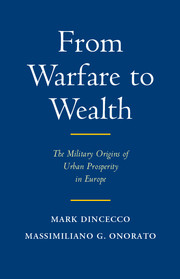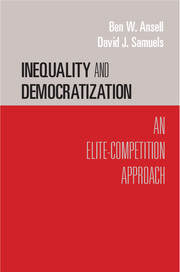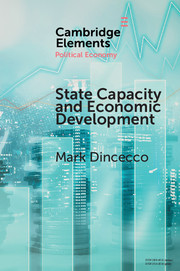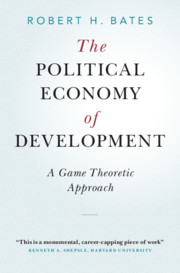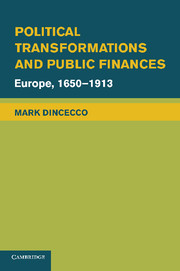From Warfare to Wealth
The economic rise of Europe over the past millennium represents a major human breakthrough. To explain this phenomenon, this book highlights a counterintuitive yet central feature of Europe's historical landscape: warfare. Historical warfare inflicted numerous costs on rural populations. Security was a traditional function of the city. To mitigate the high costs of conflict in the countryside, rural populations migrated to urban centers. Over time, the city's historical role as a safe harbor translated into local economic development through several channels, including urban political freedoms and human capital accumulation. To make this argument, the book performs a wide-ranging analysis of a novel quantitative database that spans more than one thousand years, from the fall of the Carolingian Empire to today. The book's study of urban Europe's historical path from warfare to wealth provides a new way to think about the process of long-run economic and political development.
- Provides a rich new historical perspective and integrates scholarship from demography, economics, economic history, political science, and sociology in innovative ways
- Produces predictions about optimal migration decisions that corroborate the historical evidence and help guide the statistical analyses
- Expands our understanding of the different ways in which historical warfare can influence long-run economic development patterns
Awards
Winner, 2018 William Riker Best Book Award, Political Economy Section, American Political Science Association
Reviews & endorsements
‘This bold and fascinating book argues that the prosperity of the modern West grew out of the constant warfare of medieval Europe. Conflict strengthened states and drew people to the safety of cities. Europe's remarkable combination of political competition and urbanization then spurred innovation and economic success. This remarkable book combines rich new data sources and creative ideas.' Edward Glaeser, Fred and Eleanor Glimp Professor of Economics, Harvard University, Massachusetts
‘Ever since Tilly's seminal work, scholars have studied the impact of war and state formation from the top down. In this intriguing and important work, Dincecco and Onorato approach state formation from the bottom up. War makes cities, they argue, and cities make the state. Read this book.' Robert H. Bates, Eaton Professor of the Science of Government, Harvard University, Massachusetts
‘If warfare impoverishes combatant populations, then why are the richest parts of Europe those with the most conflict-ridden pasts? This question is central to understanding European development and Dincecco and Onorato provide the most comprehensive and compelling assault on it to date.' Gary W. Cox, William Bennett Munro Professor of Political Science, Stanford University, California
‘In this ambitious and far-reaching book, Dincecco and Onorato argue that the west owes warfare for its rise to global power. This is a counter-intuitive claim, given the devastation that war wreaked upon European lands for centuries on end, but Dincecco and Onorato marshal meticulous case-study and quantitative evidence for the proposition that war moved populations into urban centers where they could be safer from predation. Once urbanized, city-dwellers were poised to demand property rights and invest in technology and human capital with long-term effects for their economies. Armed with novel data and deeply conversant with alternative arguments, this book is required reading for anyone curious about the determinants of long-standing prosperity.' Frances Rosenbluth, Damon Wells Professor of Political Science, Yale University, Connecticut
‘In this provocative book Dincecco and Onorato make a strong case for revising our conventional views of early urban growth in Europe. The continent's unhappy tradition of conflict may well have been a stimulant for development.' David Stasavage, Julius Silver Professor, New York University
Product details
December 2017Hardback
9781107162358
210 pages
236 × 158 × 17 mm
0.43kg
Available
Table of Contents
- 1. Introduction
- 2. The importance of warfare
- 3. Europe's urban rise
- 4. Evaluating the safe harbor effect
- 5. Evaluating the warfare-to-wealth effect
- 6. Warfare to wealth in comparative perspective
- Epilogue.

